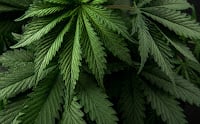Survey Finds Marijuana Use Soared Among College Students, While Alcohol Use Dropped

Drug use trends among young adults have shifted dramatically in recent years, with 44% of college students reporting past-year marijuana use in 2020, according to the 2020 Monitoring the Future (MTF) study issued yesterday. Marijuana use was similar among young adults not enrolled in college, with 43% reporting past-year use.
“The pandemic has caused fundamental changes in the daily lives of teens and adults,” John E. Schulenberg, Ph.D., of the University of Michigan Institute for Social Research and colleagues wrote. “This endemic disruption is likely to affect substance use, and MTF is uniquely designed to examine such potential period effects and quite likely lasting cohort effects.”
Since 1980, the MTF study has annually tracked substance use among college students and noncollege adults aged 19 to 22. Data for 2020 were collected between March 2020—when much of the nation began pandemic lockdowns and virtual school—and November 2020. The 2020 results are based on the online responses of 1,550 college-aged adults.
The study revealed that past-year use of hallucinogens—including LSD, psilocybin, mushrooms, and other psychedelic substances—had also significantly increased among college students, from 5% in 2019 to nearly 9% in 2020. Among noncollege adults, past-year hallucinogen use remained consistent at around 10% in 2020, compared with 8% the previous year.
College students reported significantly lower alcohol use on several key measures in 2020, compared with the prior year. For example, 56% of students reported using alcohol in the past 30 days (down from 62% in 2019), and 28% reported being drunk in the past 30 days (down from 35%). In addition, 24% of college students reported binge drinking (consuming five or more alcoholic drinks in a row at least once in the past two weeks) in 2020, down from 32% in 2019. Among young adults not in college, trends in alcohol use across all measures were stable over the past five years, with 49% of noncollege respondents reporting alcohol use in the past 30 days, 22% reporting being drunk in the past 30 days, and 24% reporting binge drinking at least once in the past two weeks.
“While binge drinking has been gradually declining among college students for the past few decades, this is a new historic low, which may reflect effects of the COVID-19 pandemic in terms of reduced time with college friends,” said Schulenberg in a media release.
Psychiatrist Encourages Informing Patients About Marijuana Risks
“The changes that we’re seeing now have been unfolding for the past 10 to 15 years,” Elie G. Aoun M.D., an assistant professor of clinical psychiatry at Columbia University, told Psychiatric News. Marijuana is easier to use without detection than alcohol, particularly the edible and vaped forms of the drug. It may also be easier for young adults to obtain, since many states now allow purchase by young adults at age 18, compared with age 21 for alcohol.
Aoun said patients may have the misconception that marijuana use is “healthy,” he said. “However, the vast majority of people are not using marijuana for its medical benefits. People use it as a drug because they want to achieve a state of feeling high and of feeling pleasure. That can be a personal choice. But it doesn’t come without costs.” He noted that marijuana use may cause sleep disturbances, cognitive distress, reduced motivation and energy, memory difficulties, poorer performance at work and school, and, for those with psychiatric disorders, deteriorating psychiatric symptoms.
What’s the bottom line? “We need to talk, talk, talk with our patients and have honest conversations about marijuana use. We shouldn’t shy away from this just because marijuana has become so available,” he said. “We can apply the same model with our patients that we use with alcohol: Recognize that it’s not necessarily a bad thing [for people] to have a drink, but that it can be problematic when they’re having consequences, when they have an addiction, or when they’re using it because they’re too depressed or anxious.”
(Image: iStock/Nastco)
Don't miss out! To learn about newly posted articles in Psychiatric News, please sign up here.






